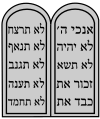Seven-Faceted Blessing
The Seven-Faceted Blessing (Hebrew: ברכה אחת מעין שבע, berakha aḥat me‘en sheva‘) is a blessing recited in the Jewish liturgy of Friday evenings. It is similar to the out-loud repetition of the `Amida, which is recited in each daytime prayer; on typical evenings, the `Amida is recited only silently, with no out-loud repetition, but on Friday nights, in honor of the Sabbath, the Seven-Faceted Blessing is recited as an abbreviated repetition.[1]
| Part of a series on |
| Judaism |
|---|
   |
|
|
|
|
|
Other religions |
|
Related topics |
|
The Seven-Faceted Blessing begins with the beginning of the text of the first blessing of the `Amida; continues with the paragraph “Magen Avot” (מגן אבות), which summarizes the themes of all seven blessings of the Sabbath `Amida; and concludes with a paragraph about the sanctity of the sabbath, and a concluding sentence: "Blessed art Thou, O Lord, who sanctifies the Sabbath."
The Seven-Faceted Blessing is recited every Friday evening of the year, even if it coincides with a festival or Yom Kippur. This is in contrast to most of the Sabbath liturgy, which is jettisoned if a particular Sabbath falls on a festival or on Yom Kippur.
The text of the Seven-Faceted Blessing (in accordance with the Ashkenazic version—other traditions have very similar versions—can be found in Seder `Avodat Yisra’el on pp. 190–191.[2] The text used in most Western Sephardic Communities can be found in "Seder Tefilah" of Mantua.[3]
In medieval Europe, it was fairly common for congregations to insert special poems, called Magen Avot piyyutim, into the middle of this blessing; however, this is no longer common today.[4]
References
- Ismar Elbogen, Der jüdische Gottesdienst in seiner geschichtlichen Entwicklung, Berlin, 1907. NEED PAGE REFERENCE.
- Seligmann, Bär, ed. (1868). Seder `Avodat Yisra’el (סדר עבודת ישראל). www.hebrewbooks.org. Rödelheim.CS1 maint: extra text: authors list (link)
- Sidur Tefillah KeMinhag Kahal Kadosh Sefaradim (סדור תפלה כמנהג קהל קדוש ספרדים), (Mantua, 1868), p. 131
- See Ezra Fleischer, "Poetic Embellishments of the Prayer ‘Magen Avot’ " (Hebrew: עיטורי פיוט לתפילת מגן אבות); Tarbiz 45 (1976-7), issue 1-2), pp. 89-107.